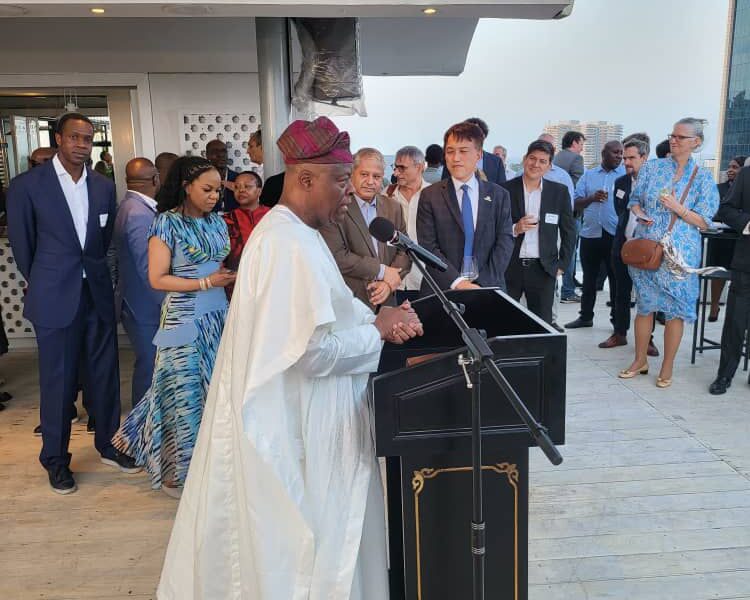A civil society organisation dedicated to transparency, accountability, and good governance in both the Nigerian public and private sectors, Make a Difference Initiative (MADI) has faulted the 12-month Board of Directors Succession Forward Plan recently announced by Seplat Energy PLC.
The extension the organization said is meant to ensure the Board Chairman, Mr. Basil Omiyi remain in office till May 2024 which is deceptive and designed for the continued tenure elongation for Omiyi and an Independent Non-Executive Director (INED), Dr. Charles Okeahalam.
MADI equally faulted what it described as a U-turn by another INED, Prof. Fabian Ajogwu, which the Board announced would now retire on 21st October 2023, saying he had no business remaining on the Board after “embarrassing” the company with his resignation reports at the weekend.

The CSO stated this during a press conference addressed by its Executive Director, Lemmy Ughegbe, in Abuja on Thursday, alleging that Omiyi’s and Okeahalam’s alleged refusal to retire from the Board after 10 years, contrary to the nine years provided by the Good Governance Code was responsible for the crisis bedevilling the company.
“The announcement has vindicated our assertion in our 23rd March 2023 statement that Mr. Basil Omiyi, and another INED, Dr. Charles Okeahalam, were plotting to continue to sit-tight on the Board contrary to the provisions of the Nigerian Code of Corporate Governance (NCCG).
“It is an unacceptable plot to perpetuate rather than cure the mischief, deception, fragrant breach of corporate governance standards, and sit-tight syndrome, which are the root causes of the prevailing crisis rocking Seplat Energy PLC.
“Whereas Section 12.10 of the NCCG unmistakably provides that “the tenure for Independent Non-Executive Directors should not exceed three terms of three years each”, Mr. Omiyi and Dr. Okeahalam refused to quit the Board despite spending over 10 years in clear breach of the Code.
“It is noteworthy that having done his maximum of nine years, Omiyi was only elected as an interim Chairman for one year in May 2022 to oversee the transition from the era of the co-founder and Pioneer Chairman Dr. ABC Orjiako and the search for Orjiako’s replacement. “But he has refused to despite a 30th January 2023 letter by institutional shareholders of Seplat demanding them to retire, having overstayed their tenures by one year each.
“It beats all imaginations that the same Omiyi, who has now spent ten years on Seplat’s Board in clear violation of Section 12.10 of the NCCG has issued a statement to elongate his tenure to May 2024 amidst all the crisis and losses that his poor leadership and clear compromises of his status as an Independent Chairman have cost the company.
“This is unacceptable. Omiyi and Okeahalam must go so that Seplat, whose share price has plummeted, can begin to toe the path of recovery.
“Besides, if the co-founders of Seplat, Dr. Orjiako and Dr. Austin Avuru, who laboured to build the company from ground zero to an international brand could retire as pioneer Chairman and CEO, respectively, in line with their promises and corporate governance standards.
“What on earth is Omiyi’s reason to sit-tight amidst the crisis and confusion he created other than to continue to enjoy the perks approved for him by Mr. Roger Brown in contravention of corporate governance standards?”
On what it saw as Prof. Ajogwu resignation prevarications, MADI said “he should be honourable and quit immediately in the interest of the company and corporate governance since there are no provisions of law or regulations preventing him from quitting the Board immediately”.
“Importantly, of what use will Prof. Ajogwu be to Seplat till October when he had told the world that deliberate external interferences would not allow him to effectively discharge his fiduciary and statutory duties as an INED?
“We also wonder what use a supposed corporate governance expert, who doesn’t feel scandalised by the continued stay of Omiyi on Seplat’s Board in clear violation of the Nigerian Corporate Good Governance Codes or the racist practices, discrimination against Nigerians, favouring of foreigners, and breach of corporate governance codes and Immigration laws for which Seplat’s CEO, Mr. Roger Brown was indicted by the FG and for which himself, Mr. Brown, Omiyi and other INEDS are facing both criminal and civil charges in Federal High Court Abuja and Federal High Court, Lagos, respectively, is to Seplat Board.
“Therefore, we hold that every shareholder’s fund spent on Prof. Ajogwu henceforth is a fraudulent waste of resources as he has said he no longer can function in his role”, the group stated.
MADI wondered why the Seplat’s corporate announcement was silent on the issue of the company’s CEO, Mr. Roger Brown, which it said was equally at the centre of the crisis in the company.
“The Board remains scared to investigate the allegations against Roger Brown as the facts speak for itself. One wonders the ‘remarkable’ value he creates for the INEDs and not the company. What manner of man is Roger Brown? Would he sit tight if this was in his country, the UK?
“The question is: What is Mr. Brown still doing at Seplat. Is all the lawsuits and crisis for which the company is presently bleeding not enough to relieve him of his appointment? What is the tie between Mr. Brown and Seplat INEDs? What personal interests are they protecting for one another? Roger Brown must go too”, MADI concluded.




